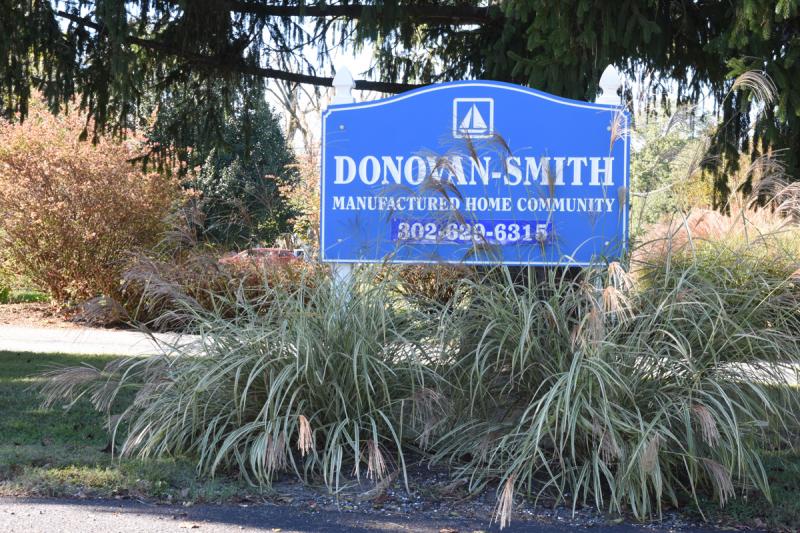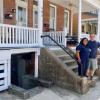The owner of the Donovan-Smith manufactured home community has reaffirmed his desire to have the park annexed into the City of Lewes.
After the initial request was made in 2017, the annexation process was delayed while the owner, Kenneth C. Burnham, attempted to secure a loan to connect the community to Lewes Board of Public Works water and sewer systems.
With everything in order, Burnham submitted a letter to Lewes Mayor and City Council in February asking that they move forward with annexation. Council has set a public hearing on the annexation and necessary rezoning for 6:30 p.m., Monday, April 4, at city hall.
To approve annexation, mayor and city council must have a four-fifths vote. At its March 14 meeting, council gave its consent for Lewes BPW to serve the property should annexation not occur.
Attorney John Paradee, representing Donovan-Smith MHP LLC, says his client is unlikely to move forward with the water and sewer project if the property is not annexed. The reason, he said, is because the Lewes BPW charges 50 percent more for water service to properties outside city limits, and his client cannot afford the extra cost.
Paradee met with Donovan-Smith residents March 28 to drum up support for annexation. He says two council members are against annexation.
Those two are Deputy Mayor Andrew Williams and Councilman Tim Ritzert. In an interview March 22, both Williams and Ritzert said they are not necessarily against annexation, but they each want more information in order to feel comfortable before moving forward.
Ritzert says the notion that he’s against annexation is a mischaracterization.
“I’m a council person elected to do my job, and my job requires due diligence,” he said. “That means asking questions and getting answers. If I cannot get the answers, then I’m going to keep asking questions.”
Ritzert says some of the numbers associated with water consumption for each unit in the park don’t add up. Other concerns include the lack of stormwater management on the property and the fact that several homes in the community are located within the 100-year floodplain.
Because the homes would be nonconforming to city code when annexed, Williams said, a significant financial burden could be put on residents, who in the future would be required to bring their homes up to city standards if any improvements are made.
“If we’re viewing this as an impoverished community, are they really in a position to bring their homes up to Lewes code standards?” Williams said. “They might have to move out. Then are we really accomplishing what we want?”
Williams said he would feel more comfortable if the state committed to providing aid to residents in the future.
Ritzert also said the issue of higher rates is not a City of Lewes issue, and that concern should be taken up with the BPW, he said.
Williams pointed out that the City of Lewes is not a party in the memorandum of understanding for the project. That agreement involves the Delaware Department of Natural Resources and Environmental Control, Delaware Department of Health and Social Services, Donovan-Smith MHP LLC, Lewes BPW and lender Wells Fargo bank.
The MOU authorizes a $2.74 million loan to the Lewes BPW for connecting the community into Lewes’ central sewer system, and a $2.87 million loan to Lewes BPW for connecting the community to the Lewes municipal water system. The project would also repave streets in the community.
The projects will be funded by loans from the Clean Water State Revolving Fund and the Drinking Water State Revolving Fund. Under the terms of the MOU, once construction is complete, the loans will be forgiven. The park owner will be responsible for residents’ water and sewer bills for 20 years. Lot rent may not be increased to pay for water and sewer costs.
The project is the first in the Clean Water Initiative for Underserved Communities, which is administered by DNREC and was proposed by Gov. John Carney to protect public health, and minimize environmental hazards and risk for all Delawareans.
The DWSRF, within DHSS, provides support to Delaware drinking water systems through the Disadvantaged Community Subsidy program. This program ensures that DWSRF loans can be forgiven for projects benefitting the most vulnerable communities. Forgiveness of these loans ensures safe drinking water is provided without creating substantial burdens on household budgets.
Improvements to Donovan-Smith’s infrastructure have been a long time coming. In July 2021, DNREC issued a notice of violation to Donovan-Smith Mobile Home Park LLC in Lewes for ongoing violations of the state’s laws governing wastewater treatment and disposal systems. The community’s onsite wastewater treatment system was found by DNREC to be out of compliance, and posing risks to public health and the environment. The surfacing wastewater posed public health exposure concerns and contributed to groundwater pollution.
In 2018, the park’s residents challenged lot-rent increases, citing the poor condition of the community.
The City of Lewes’ last major annexation of an existing community was Highland Acres in 2015. In that case, a special election was held. Both Lewes citizens and Highland Acres residents voted, with both groups approving annexation.
For Donovan-Smith, because the property has a single owner, a special election is not required.





















































